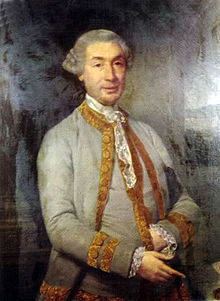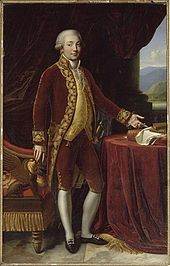- Carlo Buonaparte
-
Carlo Maria Buonaparte (27/29 March 1746[1] – 24 February 1785) was a Corsican lawyer and politician who briefly served as a personal assistant of the revolutionary leader Pasquale Paoli and eventually rose to become Corsica's representative to the court of Louis XVI. After his death, his son Napoleon became Emperor of France, and several of his other children received royal titles from their brother.
Contents
Early life
He was born in Ajaccio, Corsica as the youngest of three children. His father Giuseppe Buonaparte[2] had represented Ajaccio to the council of Corte in 1749. Carlo initially followed in his father's footsteps and studied to be a lawyer at Pisa University, but following a substantial inheritance from the death of his father he left after finishing part-way to marry Maria Letizia Ramolino. Both were of Corsican nobility, and very young at the time of their marriage (Carlo was seventeen, and Marie was fourteen).[3][4] Their marriage is often seen as one of economic convenience. Buonaparte's new wife brought with her a dowry of thirty-one acres, including a mill and bakery which yielded an annual income of roughly £10,000.[3]
French takeover
Main article: French Conquest of CorsicaFor a period after his marriage at Ajaccio on 2/7 June 1764, he worked as a secretary and personal assistant to Pasquale Paoli. He had a son, Napoleone, who died in infancy in 1765 as did a daughter.[5] Paoli sent him to Rome to negotiate with Pope Clement XIII in 1766. He had apparently enjoyed his time in Rome up until being forced for reasons unknown back to Corsica in 1768 - though he had possibly enjoyed an affair with a married woman during his stay which led to his departure.[5] At the time of his return, the Republic of Genoa had offered Corsica to Louis XV as payment for a debt. The French were eager to obtain the strategically placed island for the protection of their own coasts, and Genoa equally keen to relinquish control given their inability to resist growing independence movements.[5] Buonaparte was noted for a fervent speech against the French "invasion". Political upheaval followed as France gained ownership of Corsica, and many of Paoli's supporters had to flee to the mountains. Buonaparte and his family, now boasting newborn Giuseppe, who was the first child to survive infancy,[6] were included. The family eventually returned to the town, where Buonaparte's wife gave birth to third son, another Napoleone, within Ajaccio Cathedral.[6]
Soon after French acquisition of the island, Carlo Buonaparte embraced the new government. He was appointed Assessor of the Royal Jurisdiction of Ajaccio and the neighbouring districts on 20 September 1769. Shortly after that he became a Doctor in Laws at the University of Pisa on 27 November 1769.
Rise to prominence
In April 1770, the French administration created a Corsican Order of Nobility. He became an advocate of the Superior Council of Corsica on 11 December 1769 and a Substitute Procurator of the King of France in Ajaccio in October 1770. Carlo already possessed the title of a "Noble Patrician of Tuscany" (Nobile Patrizio di Toscana) since 1769 by permission of the Archbishop of Pisa due to his ancestry, and had his nobility confirmed on 13 September 1771. He then became the assessor of the Royal Jurisdiction of Ajaccio in February 1771, Deputy of the Nobility in the General States of Corsica on 13 September 1771, Member of the Council of the Twelve Nobles of Dila (Western Corsica) on May 1772, Deputy of the Nobility of Corsica at the Royal French Court in July 1777 and finally he was named Corsica's Representative to the Court of Louis XVI of France at Versailles in 1778.[7]
Despite being honored with many titles, Buonaparte's dissatisfied nature led him to embark in risky business enterprises. He made many claims on land and money through legal means, but his success was limited, and he burned through his finances rapidly. His apparent fondness of gambling worsened his monetary difficulties. Buonaparte made note of his situation in his account book:
In Paris, I received 4,000 francs from the King and a fee of 1,000 crowns from the government, but I came back without a penny.
In 1782, Buonaparte was beginning to grow weak, and was suffering from constant pain. He traveled to Montpellier to seek proper medical care. Nothing could be done to quell the effects of what was believed to be stomach cancer,[8] the same disease that may have killed his first son Napoleon.[9] Carlo Buonaparte died on 24 February 1785, and due to his frivolous spending, left his surviving wife and eight children penniless. However, Napoleon I supported the family during his reign. His youngest son was born only three months before he died.
Children
Carlo Buonaparte's marriage to Maria Letizia Ramolino produced thirteen children, including a stillborn child. Eight of their children survived until adulthood.[10]
- Napoleone (1765 – 17 August 1765).
- Maria Anna Bonaparte (3 January 1767 – 1 January 1768).
- Joseph (7 January 1768 – 28 July 1844).
- Napoleon (15 August 1769 – 5 May 1821).
- Maria Anna Bonaparte (1770)
- Maria Anna Bonaparte (14 July 1771 - 23 November 1771).
- A Stillborn son (1773).
- Lucien (21 May 1775 – 29 June 1840).
- Elisa (13 January 1777 – 7 August 1820).
- Louis (2 September 1778 – 25 July 1846).
- Pauline (20 October 1780 – 9 June 1825).
- Caroline (24 March 1782 – 18 May 1839).
- Jérôme (15 November 1784 – 24 June 1860).
Notes
- ^ Seward, Desmond, Napoleon's Family, (Viking Penguin, 1986), 6.
- ^ Richardson, Hubert N. B., A dictionary of Napoleon and his times, (Cassel and Company LTD:London, 1920), 85.
- ^ a b Harvey, p. 58.
- ^ Seward, 6.
- ^ a b c Harvey, p. 59.
- ^ a b Harvey, p. 60.
- ^ Seward, 9.
- ^ Herold, J. Christopher, The Age of Napoleon , (American Heritage Inc, 1963), 18.
- ^ McLynn, p.656
- ^ Seward, 8.
References
- Harvey, R. The War of Wars, Robinson, 2006.
- Herold, J. Christopher, The Age of Napoleon , American Heritage Inc, 1963.
- McLynn, Frank, Napoleon, Pimlico, 1998. ISBN 0712662472.
- Richardson, Hubert N. B., A dictionary of Napoleon and his times, Cassel and Company LTD:London, 1920.
- Seward, Desmond, Napoleon's Family, Viking Penguin, 1986.
External links
Categories:- 1746 births
- 1785 deaths
- People from Ajaccio
- 18th-century French people
- House of Bonaparte
- Deaths from stomach cancer
- Cancer deaths in France
Wikimedia Foundation. 2010.


